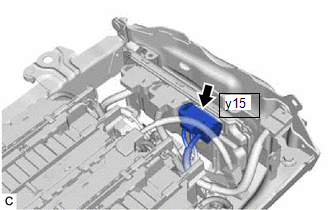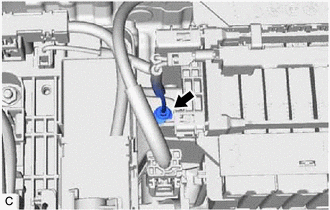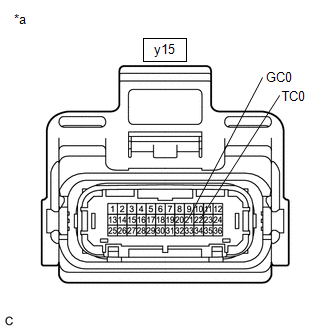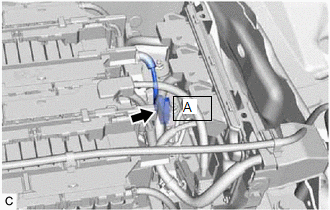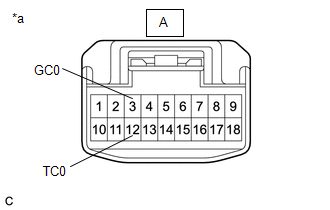| Last Modified: 09-10-2025 | 6.11:8.1.0 | Doc ID: RM100000001RK1I |
| Model Year Start: 2021 | Model: Avalon HV | Prod Date Range: [08/2020 - ] |
| Title: HYBRID / BATTERY CONTROL: HYBRID BATTERY SYSTEM (for LITHIUM-ION BATTERY): P0AAC11,P0AAC15; Hybrid/EV Battery Air Temperature Sensor "A" Circuit Short to Ground; 2021 - 2022 MY Avalon HV [08/2020 - ] | ||
|
DTC |
P0AAC11 |
Hybrid/EV Battery Air Temperature Sensor "A" Circuit Short to Ground |
|
DTC |
P0AAC15 |
Hybrid/EV Battery Air Temperature Sensor "A" Circuit Short to Auxiliary Battery or Open |
DESCRIPTION
The inlet air temperature sensor (HV battery) is mounted on the HV battery. The resistance of the sensor varies in accordance with changes in the intake air temperature. The characteristics of the inlet air temperature sensor are the same as those of the battery temperature sensors (Click here
![2021 - 2022 MY Avalon HV [08/2020 - ]; HYBRID / BATTERY CONTROL: HYBRID BATTERY SYSTEM (for LITHIUM-ION BATTERY): P0A9B11,...,P0C3315; Hybrid/EV Battery Temperature Sensor "A" Circuit Short to Ground+](/t3Portal/stylegraphics/info.gif) ). The battery ECU assembly uses signals from the inlet air temperature sensor to control the air volume of the battery cooling blower assembly.
). The battery ECU assembly uses signals from the inlet air temperature sensor to control the air volume of the battery cooling blower assembly.
|
DTC No. |
Detection Item |
DTC Detection Condition |
Trouble Area |
MIL |
Warning Indicate |
|---|---|---|---|---|---|
|
P0AAC11 |
Hybrid/EV Battery Air Temperature Sensor "A" Circuit Short to Ground |
The inlet air temperature sensor output voltage is lower than the specified value (short circuit) and the detected temperature is higher than the specified value. (1 trip detection logic) |
|
Does not come on |
Master Warning Light: Comes on |
|
P0AAC15 |
Hybrid/EV Battery Air Temperature Sensor "A" Circuit Short to Auxiliary Battery or Open |
The inlet air temperature sensor output voltage is higher than the standard value (short to +B or open) and the detected temperature is lower than the specified value. (1 trip detection logic) |
|
Does not come on |
Master Warning Light: Comes on |
HINT:
After checking for the above DTCs, check the hybrid system Data List item "Hybrid/EV Battery Cooling Fan Intake Air Temperature 1" using the Techstream.
|
Displayed Temperature |
Malfunction |
|---|---|
|
-45°C (-49°F) or less |
Open or +B short circuit |
|
95°C (203°F) or more |
GND short |
Related Data List
|
DTC No. |
Data List |
|---|---|
|
P0AAC11 |
Hybrid/EV Battery Cooling Fan Intake Air Temperature 1 |
|
P0AAC15 |
CONFIRMATION DRIVING PATTERN
HINT:
After repair has been completed, clear the DTC and then check that the vehicle has returned to normal by performing the following All Readiness check procedure.
- Connect the Techstream to the DLC3.
- Turn the power switch on (IG) and turn the Techstream on.
- Clear the DTCs (even if no DTCs are stored, perform the clear DTC procedure).
- Turn the power switch off and wait for 2 minutes or more.
- Turn the power switch on (IG) and turn the Techstream on.
- With power switch on (IG) and wait for 5 seconds.
- Enter the following menus: Powertrain / HV Battery / Utility / All Readiness.
-
Check the DTC judgment result.
HINT:
- If the judgment result shows NORMAL, the system is normal.
- If the judgment result shows ABNORMAL, the system has a malfunction.
- If the judgment result shows INCOMPLETE or N/A, perform driving pattern again.
WIRING DIAGRAM
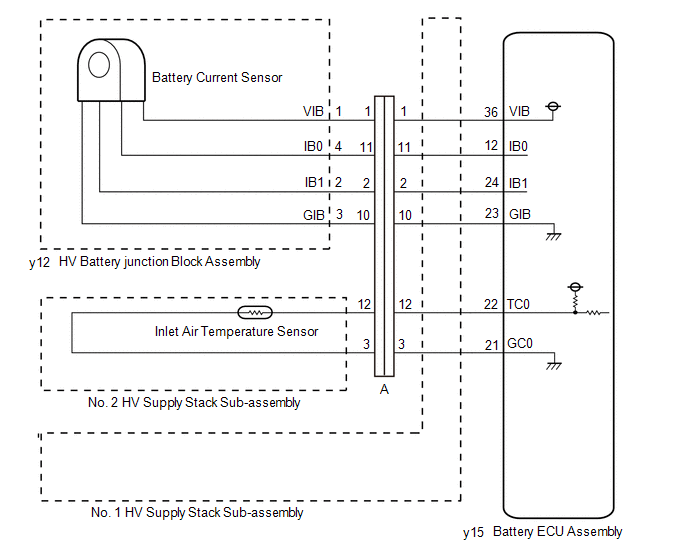
CAUTION / NOTICE / HINT
CAUTION:
-
Before the following operations are conducted, take precautions to prevent electric shock by turning the power switch off, wearing insulated gloves, and removing the service plug grip from HV battery.
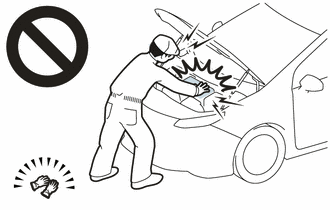
- Inspecting the high-voltage system
- Disconnecting the low voltage connector of the inverter with converter assembly
- Disconnecting the low voltage connector of the HV battery
-
To prevent electric shock, make sure to remove the service plug grip to cut off the high voltage circuit before servicing the vehicle.
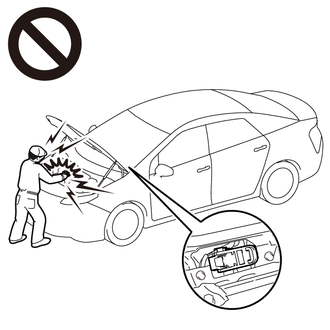
-
After removing the service plug grip from the HV battery, put it in your pocket to prevent other technicians from accidentally reconnecting it while you are working on the high-voltage system.
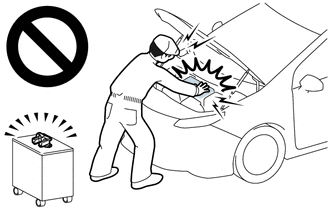
-
After removing the service plug grip, wait for at least 10 minutes before touching any of the high-voltage connectors or terminals. After waiting for 10 minutes, check the voltage at the terminals in the inspection point in the inverter with converter assembly. The voltage should be 0 V before beginning work.
HINT:
Waiting for at least 10 minutes is required to discharge the high-voltage capacitor inside the inverter with converter assembly.
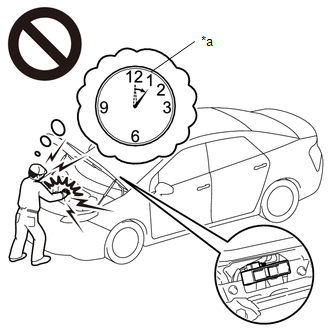
*a
Without waiting for 10 minutes
-
Make sure to insulate the high-voltage connectors and terminals of the HV battery with insulating tape after removing it.
If the HV battery stored without insulating the connectors and terminals, electric shock or fire may result.
-
When disposing of an HV battery, make sure to return it through an authorized collection agent who is capable of handling it safely. If the HV battery is returned via the manufacturer specified route, it will be returned properly and in a safe manner by an authorized collection agent.
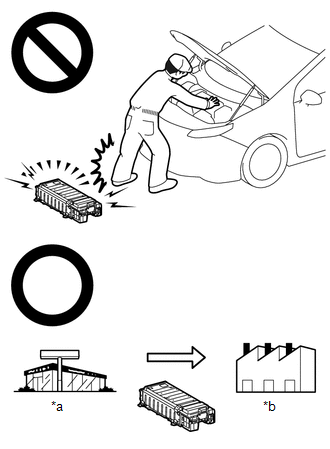
*a
Dealer
*b
Battery Collection Agent
- Accidents such as electric shock may result if the HV battery is disposed of improperly or abandoned. Therefore, make sure to return all HV batteries through an authorized collection agent.
- Before returning the HV battery, make sure to perform a recovery inspection.
- Before returning the HV supply stack sub-assembly, make sure to perform a recovery inspection.
- Make a note of the output DTCs as some of them may be necessary for recovery inspection of the HV battery and HV supply stack sub-assemblies.
-
After removing the HV battery, keep it away from water. Exposure to water may cause the HV battery to produce heat, resulting in a fire.
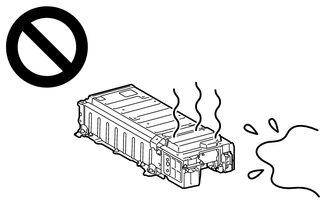
NOTICE:
After turning the power switch off, waiting time may be required before disconnecting the cable from the negative (-) auxiliary battery terminal. Therefore, make sure to read the disconnecting the cable from the negative (-) auxiliary battery terminal notices before proceeding with work.
PROCEDURE
PROCEDURE
|
1. |
CHECK DTC OUTPUT (HV BATTERY, HYBRID CONTROL) |
(a) Connect the Techstream to the DLC3.
(b) Turn the power switch on (IG).
(c) Enter the following menus: Powertrain / HV Battery and Hybrid Control / Trouble Codes.
(d) Check for DTCs.
Powertrain > HV Battery > Trouble Codes
Powertrain > Hybrid Control > Trouble Codes
|
Result |
Proceed to |
|---|---|
|
"P0AAC11 or P0AAC15" only is output, or DTCs except the ones in the table below are also output. |
A |
|
DTCs of hybrid battery system in the table below are output. |
B |
|
DTCs of hybrid control system in the table below are output. |
C |
|
System |
Relevant DTC |
|
|---|---|---|
|
Hybrid battery system |
P060A47 |
Hybrid/EV Battery Energy Control Module Monitoring Processor Watchdog / Safety MCU Failure |
|
P060B49 |
Hybrid/EV Battery Energy Control Module A/D Processing Internal Electronic Failure |
|
|
P060687 |
Hybrid/EV Battery Energy Control Module Processor to Monitoring Processor Missing Message |
|
|
Hybrid control system |
P0A1F94 |
Hybrid/EV Battery Energy Control Module Unexpected Operation |
(e) Turn the power switch off.
| B |

|
| C |

|
GO TO DTC CHART (HYBRID CONTROL SYSTEM) |
|
|
2. |
CHECK CONNECTOR CONNECTION CONDITION (BATTERY ECU ASSEMBLY CONNECTOR) |
CAUTION:
Be sure to wear insulated gloves and protective goggles.
(a) Check that the service plug grip is not installed.
NOTICE:
After removing the service plug grip, do not turn the power switch on (READY), unless instructed by the repair manual because this may cause a malfunction.
(b) Remove the No. 1 HV battery hose.
|
(c) Check the connector connections and contact pressure of the relevant terminals for the battery ECU assembly. OK: The connector is connected securely and there are no contact problems. |
|
(d) Install the No. 1 HV battery hose.
| NG |

|
CONNECT SECURELY |
|
|
3. |
CHECK INSTALLATION OF INLET AIR TEMPERATURE SENSOR |
CAUTION:
Be sure to wear insulated gloves and protective goggles.
(a) Check that the service plug grip is not installed.
NOTICE:
After removing the service plug grip, do not turn the power switch on (READY), unless instructed by the repair manual because this may cause a malfunction.
(b) Remove the upper HV battery cover sub-assembly.
|
(c) Visually check the installation condition of the inlet air temperature sensor. Result:
|
|
(d) Install the upper HV battery cover sub-assembly.
| B |

|
REPLACE NO. 2 HV SUPPLY STACK SUB-ASSEMBLY |
| C |

|
INSTALL PARTS CORRECTLY |
|
|
4. |
CHECK HV BATTERY (INLET AIR TEMPERATURE SENSOR) |
CAUTION:
Be sure to wear insulated gloves and protective goggles.
(a) Check that the service plug grip is not installed.
NOTICE:
After removing the service plug grip, do not turn the power switch on (READY), unless instructed by the repair manual because this may cause a malfunction.
(b) Remove the No. 1 HV battery hose.
|
(c) Disconnect the y15 battery ECU assembly connector. NOTICE: Before disconnecting the connector, check that it is not loose or disconnected. |
|
|
(d) Measure the resistance according to the value (s) in the table below. Standard Resistance:
NOTICE: When taking a measurement with a tester, do not apply excessive force to the tester probe to avoid damaging the holder. |
|
(e) Measure the resistance according to the value (s) in the table below.
Standard Resistance:
|
Tester Connection |
Condition |
Specified Condition |
|---|---|---|
|
y15-22 (TC0) - Body ground and other terminals |
Power switch off |
10 kΩ or higher |
|
y15-21 (GC0) - Body ground and other terminals |
Power switch off |
10 kΩ or higher |
(f) Connect the cable to the negative (-) auxiliary battery terminal.
(g) Turn the power switch on (IG).
(h) Measure the voltage according to the value (s) in the table below.
Standard Voltage:
|
Tester Connection |
Switch Condition |
Specified Condition |
|---|---|---|
|
y15-22 (TC0) - Body ground |
Power switch on (IG) |
Below 1 V |
|
y15-21 (GC0) - Body ground |
Power switch on (IG) |
Below 1 V |
NOTICE:
- Turning the power switch on (IG) with the service plug grip removed causes other DTCs to be stored. Clear the DTCs after performing this inspection.
- If the power switch is turned on (IG) with the connectors disconnected, other DTCs will be stored. Be sure to clear the DTCs after the inspection.
(i) Turn the power switch off.
(j) Disconnect the cable from the negative (-) auxiliary battery terminal.
(k) Reconnect the y15 battery ECU assembly connector.
(l) Install the No. 1 HV battery hose.
| NG |

|
|
|
5. |
CHECK BATTERY ECU ASSEMBLY (VIB VOLTAGE) |
| OK |

|
REPLACE BATTERY ECU ASSEMBLY |
| NG |

|
|
6. |
CHECK HV BATTERY JUNCTION BLOCK ASSEMBLY (BATTERY CURRENT SENSOR OUTPUT VOLTAGE) |
| OK |

|
REPLACE HV BATTERY JUNCTION BLOCK ASSEMBLY |
| NG |

|
|
7. |
CHECK HARNESS AND CONNECTOR (NO. 2 HV SUPPLY STACK SUB-ASSEMBLY - HV BATTERY JUNCTION BLOCK ASSEMBLY) |
| NG |

|
REPLACE NO. 2 HV SUPPLY STACK SUB-ASSEMBLY |
|
|
8. |
CHECK HARNESS AND CONNECTOR (BATTERY ECU ASSEMBLY - NO. 1 HV SUPPLY STACK SUB-ASSEMBLY) |
| OK |

|
REPLACE BATTERY ECU ASSEMBLY |
| NG |

|
REPLACE NO. 1 HV SUPPLY STACK SUB-ASSEMBLY |
|
9. |
CHECK HV BATTERY (INLET AIR TEMPERATURE SENSOR) |
CAUTION:
Be sure to wear insulated gloves and protective goggles.
(a) Check that the service plug grip is not installed.
NOTICE:
After removing the service plug grip, do not turn the power switch on (READY), unless instructed by the repair manual because this may cause a malfunction.
(b) Remove the No. 1 HV battery hose.
|
(c) Disconnect the A No. 2 HV supply stack sub-assembly connector. NOTICE: Before disconnecting the connector, check that it is not loose or disconnected. |
|
|
(d) Measure the resistance according to the value (s) in the table below. Standard Resistance:
|
|
(e) Measure the resistance according to the value (s) in the table below.
Standard Resistance:
|
Tester Connection |
Condition |
Specified Condition |
|---|---|---|
|
A-12 (TC0) - Body ground and other terminals |
Power switch off |
10 kΩ or higher |
|
A-3 (GC0) - Body ground and other terminals |
Power switch off |
10 kΩ or higher |
(f) Connect the cable to the negative (-) auxiliary battery terminal.
(g) Turn the power switch on (IG).
(h) Measure the voltage according to the value (s) in the table below.
Standard Voltage:
|
Tester Connection |
Switch Condition |
Specified Condition |
|---|---|---|
|
A-12 (TC0) - Body ground |
Power switch on (IG) |
Below 1 V |
|
A-3 (GC0) - Body ground |
Power switch on (IG) |
Below 1 V |
NOTICE:
- Turning the power switch on (IG) with the service plug grip removed causes other DTCs to be stored. Clear the DTCs after performing this inspection.
- If the power switch is turned on (IG) with the connectors disconnected, other DTCs will be stored. Be sure to clear the DTCs after the inspection.
(i) Turn the power switch off.
(j) Disconnect the cable from the negative (-) auxiliary battery terminal.
(k) Reconnect the A No. 2 HV supply stack sub-assembly connector.
(l) Install the No. 1 HV battery hose.
| OK |

|
REPLACE NO. 1 HV SUPPLY STACK SUB-ASSEMBLY |
| NG |

|
REPLACE NO. 2 HV SUPPLY STACK SUB-ASSEMBLY |
|
|
|

